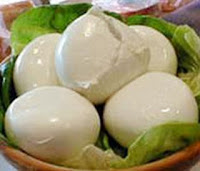I have wanted to learn how to make cheese for years, but never really got around to putting any time into researching the topic until recently. Cheesemaking has always seemed to me a bit like alchemy (the making of stones into gold) - mysterious, magical things happen, you have to use special stuff, and if you don't do it right, it doesn't work. In the alchemy days, you had to have an affinity for the material. If you did everything right, but the stones didn't like you, it didn't work. Like alchemy, the secrets are passed around among a certain, select group of people - at least that's what I thought. All of course, were a series of excuses for the fact that alchemy isn't possible, but most people never knew that!
I've been reading a bit lately on the internet (the source of all wisdom) about making cheese. Frustratingly, the information is not consistent. Some people write that you must use unhomogenized milk to start. Some write that it must be unpasteurized. Some say that it can be homogenized and pasteurized, but not too much. Etc, etc, etc, just leaving me thoroughly confused. Then there's raising temperatures, lowering temperatures at a certain rate (ex. 2 degrees per 5 minutes from xx to xx), holding temperatures constant in a water bath. It all sounds very difficult. It does seem a bit like alchemy.
But, is making cheese more difficult or less difficult that making roving or yarn from fiber? I know they're different types of work, making comparison difficult. Until I try it, I just won't know the answer to that. So try it, I will.
I got the intro cheesemaking kit last night (in the mail from the New England Cheesemaking Company) and started reading. Here's what they say about milk. It doesn't need to be raw milk, but it cannot be ultrapasteurized. It will say ultrapasteurized on the label if it is. Most milk in the grocery store is ultrapasteurized. Some normal pasteurization occurs at a temperature too high, killing the bacteria that make cheese, so sometimes the label won't say ultrapasteurized but the cheese won't work. NO milk in the grocery store is ever raw. It is illegal, except in some states you can buy it directly from the farm. There is a growing list of milk sources here.
My plans for this weekend are firming up (hee, hee, a little cheesy pun). Stop by Stewarts on the way home on Friday and pick up some fresh milk. Crawl into the shed to get out the stainless steel pots (since the front door to the shed won't open until spring). Make cheese! Lots and lots of cheese!









I just checked my carton of Stewart's, the only milk I buy. It doesn't say a word about any pasteurization at all, but there must be some.
ReplyDeleteP.S. Buy from the same Stewart's and pick up a milk card. When it's filled, you get a free carton.
How exciting!!! That was the same for me when I was trying to teach my self how to make soap. Not very consistent with the information I could find. I finaly figured it out and now sell soap...So good luck with the cheese, I want to make my own cheese too some day so please let us know how it goes!
ReplyDeleteThanks for the suggestion about the milk card, Kate, I just picked it up yesterday, and already it's got 4 out of 10 filled out!
ReplyDeleteThanks Christine! I made the first cheese last night, and it's not as hard as I expected!!